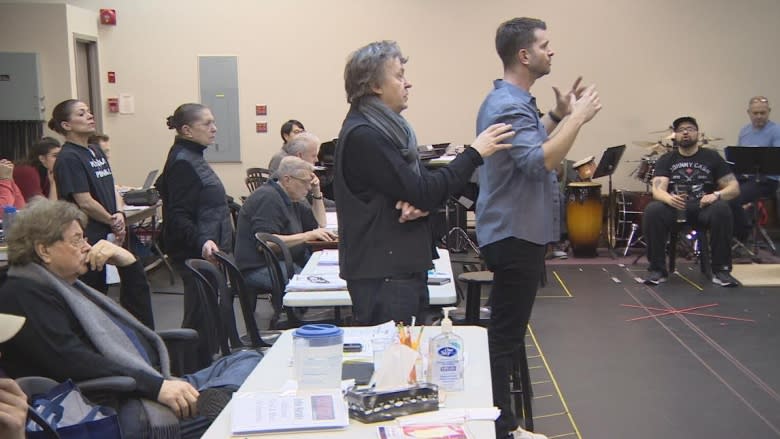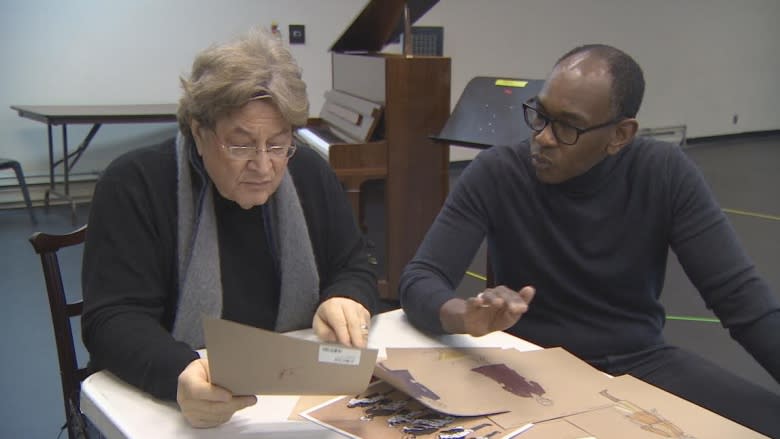With new musical Sousatzka, Garth Drabinsky courts the limelight again
As the new musical Sousatzka prepares for its premiere in Toronto next week, there's more at stake than just wooing the audience with catchy tunes and belting voices: The musical is seen by many as the attempted comeback of its producer, Garth Drabinsky.
But not by Drabinsky himself. "I ignore it. I never took position that I left the entertainment business," said Drabinsky in an interview with CBC News.
"I've obviously had to deal with issues and I have dealt with them and I'm just moving ahead with the rest of my life right now, and it's another important show for me to have my imprimatur on. But I don't want to raise the stakes beyond rationality by using terms like comeback and so on," he said.
Dramatic rise and fall
There's little doubt the stakes are high. The story of Drabinsky's rise and fall rivals the on-stage drama of any of his theatrical enterprises.
At 29, Drabinsky co-founded the revolutionary Cineplex multiplex theatre chains. In the 1990s, with his theatre production company Livent Inc, he made his name in the world of musicals, staging lavish shows that even wowed Broadway.
There was The Phantom of the Opera, which had a decade-long sold-out run at Toronto's Pantages Theatre. Drabinsky also produced Ragtime, Showboat and Kiss of the Spider Woman, Broadway extravaganzas that garnered Livent 19 Tonys.
But in 1998, it all came to a halt. Livent sought bankruptcy protection, claiming a debt of more than $300 million.
The subsequent investigation and court case found Drabinsky and his partner Myron Gottlieb guilty of fraud and forgery, for misstating the reported income of Livent. Drabinsky was sentenced to seven years in jail, but appealed and received a reduced sentence. In the end, he served 17 months and was released on parole in 2013.
Artists loyal to Drabinsky
But amazingly, during his absence from the entertainment world, Drabinsky doesn't seem to have lost the magic touch that enticed some of Broadway's most accomplished performers and artists to work with him. Sousaztka's team includes a bevy of Tony-winners, like Paul Tazewell, who recently created the dazzling period costumes for the musical Hamilton.
Many performers have come from the United States for the chance to work with one of their favourite producers in the business. Richard Maltby Jr. worked with Drabinsky on 1999's Fosse; in Sousatzka, he's the lyricist.
"If he's hired you, you are by definition the best person on the face of the earth to do that job and he treats you like that," said Maltby of working with Drabinsky.
British theatre director Adrian Noble, who worked with Drabinsky on CBC's Triple Sensation, says he had no qualms about answering his call.
Due to his legal troubles, Drabinsky is not handling the money involved with the show; he's only overseeing its creative aspects.
"He was found guilty, he went to prison, he did his time and he came out, and he's getting on with it. There was never any question whether or not he's a brilliant producer," said Noble.
Sousatzka's story: a draw or a turn-off?
For others involved with the project, it's the storyline of Sousatzka that was the big draw, and that story, too, came from Drabinsky's showbiz instincts.
The tale of a Nazi-occupation survivor, a piano teacher, who meets an unlikely friend in a prodigy fleeing South African apartheid, has been on Drabinsky's mind for a while. Cineplex Odeon, which he headed at the time, produced a similar 1988 movie Madame Sousatzka starring Shirley MacLaine (in the film, Sousatzka was Russian and the young piano player a boy from India).
With book writer Craig Lucas changing the script to make it better suited to a musical, Drabinsky believes he got something that will resonate with a modern audience: A story of refugees, terrors of xenophobia, and commonality of the human spirit.
Tony-winning Broadway actress Victoria Clark plays the title role of Madame Sousatzka.
"What resonates with me about the timeliness of this piece is the racial strife we're still experiencing in the world and the lack of, especially in the U.S., our country's lack of finding a solution, and I think it really does begin with taking the time to get to know someone and understand each other, and that's what this piece was all about."
But not everyone believes Sousatzka's political message will resonate with a musical audience seeking escapist entertainment. Producer and filmmaker Barry Avrich directed a documentary on Drabinsky called Show Stopper: the theatrical life of Garth Drabinsky.
"Garth is a risk-taker. Garth wants to be the guy that sort of came out of prison, spent some time there reading and studying philosophy and finding religion and saying 'You know what? It's a new world out there in this Trump era and this is the musical of our time.' Hmm, we'll see."
He adds that Sousatzka's very title may be a problem: "How are you going to come out of the theatre singing a song when you can't pronounce the name of the show? It's going to be a tough, uphill battle."
Can the people forgive?
Of course, the real decider of how successful Sousatzka will be is the audience. Drabinsky's name is not concealed on the promotional material.
There are certainly still those who distrust him: some online, claiming to be the people whose money he took. The Globe and Mail theatre critic Kelly Nestruck recently argued that Sousatzka can't be called Drabinsky's comeback since his past glories were made possible by fraudulent means.
But Drabinsky says he saw a different picture while interacting with audiences during the previews.
"I don't hide in the theatre," said Drabinsky. "There are dozens of people who walk by me every night, who know who I am, and they've been fantastically generous in their response to me and very kind in the process."
Drabinsky, who hopes to take Sousaztka from Toronto to Broadway eventually, will find his answer when the musical opens at Toronto' Elgin Theatre on March 23.



